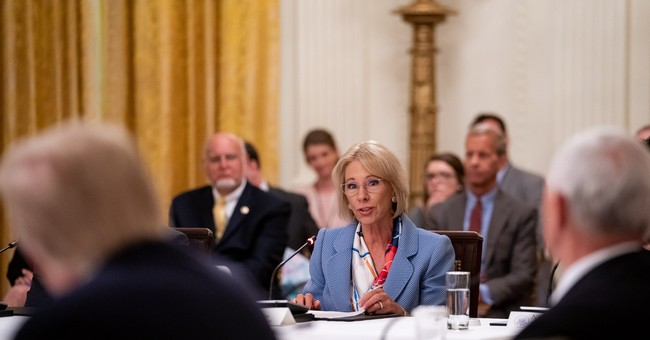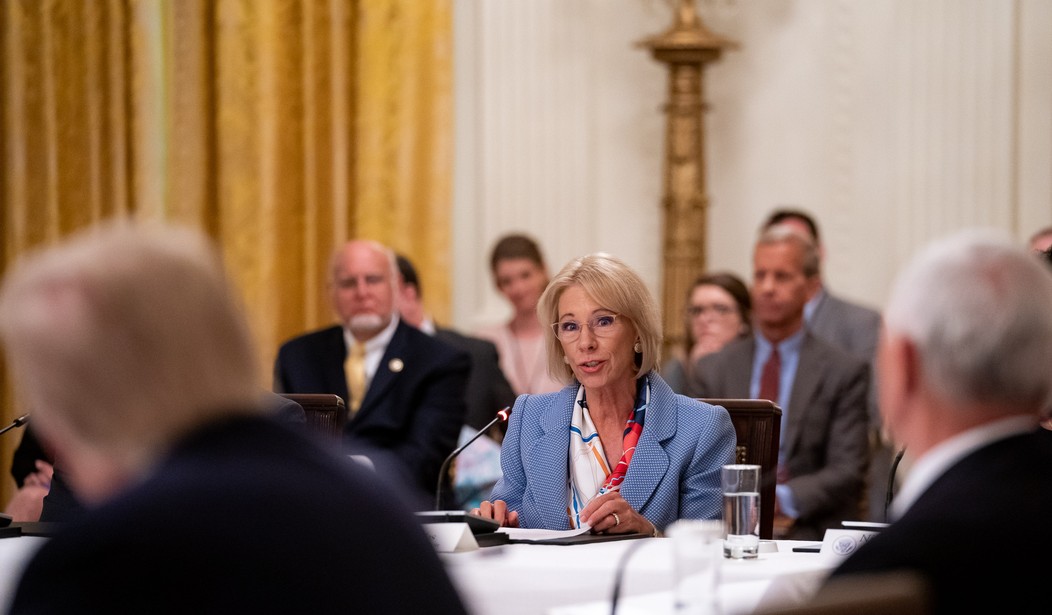
It is too easy for the mainstream media and punditry class to focus on the fights over when and how to open schools in the fall – notably, how to bring children back into schools. Seeking to responsibly bring children back to in-person environments that incorporate academic, social, athletic, and extracurricular learning opportunities is not pursuing automatic death sentences for our youth, regardless of how heart-wrenching the headlines and chyrons may read.
It is too easy for teacher unions to use the crisis in education during the pandemic as an opportunity to “raise concerns” that have more to do with union issues than schoolchildren’s issues – items such as curtailing the expansion of charter schools and increasing taxes. Never letting a good crisis go to waste is a mantra that never seems to go out of style for some on the political left.
Access to a publicly-funded education is a constitutional right that is codified in many states; (notice that this is different than a right to access to a public-school education, regardless of its quality or lack thereof). Further, a quality education for a diversified future workforce is a national security issue. Regardless of the threat that COVID-19 continues to pose to the nation, there is an inherent obligation for all Americans – from the President and his administration to the everyday community member – to uphold the constitutional tie that we have to ensure the national sovereignty of this great nation. One vital and required way to fulfill this task is through providing the necessary education for our children each quarter, each week, and every day.
That did not happen once COVID-19 hit our shores in 2020. That cannot happen again moving into the 2020-2021 school year.
Therefore, school choice and school innovation are critical right now – regardless of the self-centered pushback that teachers’ unions and the professional left will propagate.
Innovative ways to close the pandemic-driven education gaps suffered by the socioeconomically-disadvantaged who are most vulnerable to the wholistic impacts of the novel coronavirus include the introduction of “Back on Track” Education Savings Accounts. These accounts, currently proposed in Pennsylvania to primarily aid children who receive free-and-reduced-cost lunches, would provide the resources necessary to bridge the academic gaps created when thousands of schoolchildren were locked away from learning for weeks due to the bureaucratic bungling from the Governor and school officials alike last spring.
More options are supported by recent federal developments. Education Secretary Betsy DeVos expressed willingness to allow federal funding to “follow the child” to the school of parental choice in instances where traditional schools are incapable or unwilling to open. The Supreme Court recently ruled that if states support school choice programs with public resources, all schools must be eligible to receive the funding. These two developments will allow more at-risk children to seek academic options that have the necessary flexibility to assess the needs of the children and react to them adequately.
Yet, school choice does not mean no support for local public schools. For parents who choose public schools, smart directives must be advanced to ensure that learning – not just school – occurs this fall in traditional schools. Efforts to increase training necessary to optimize virtual teaching models and hybrid teaching this fall should be prioritized over calls for hazard pay for teachers in public schools. Decisions should be made to address the emotional and psychological impacts of coronavirus on these schoolchildren (particularly those who have suffered increased economic instability and healthcare crises) so that mental health professionals – not teachers – are primarily tasked with confronting these challenges. Extracurricular activities that teach different lessons with primary and secondary education should be given the extra care necessary to keep these programs on track, as music lessons and team sports are often as vital to children’s development as academic rigor alone can be.
Even as we focus on getting our economy back on track in order to normalize our lives, we must not divert our attention away from the work required to prepare the next generation of Americans. It is too easy to forget during the “Fog of 2020” that our nation was lagging behind on education globally, notably with lower-than-expected scores in science, math, and reading. As a result, our global leadership on technology and innovation continues to dwindle as China, India, and Russia continue to make gains. As well, with news that China’s economy has grown during the second quarter of 2020, coupled with disappointing unemployment news this week here at home, this indicates that the economic tug-of-war that continues within the global economy will not be won without a reliable resurgence of American ingenuity, both now and for years to come. Education is the driver that uplifts quality of life. It fosters economic vitality and legacy for millions. It upholds domestic tranquility and equality. It secures national security economically and militarily.
The fight for education for the remainder of 2020 must be the pursuit of effective teaching methods and knowledge growth by American children through an array of options because of this pandemic. Fighting for open schools so that parents can also return to work is not good enough. Fighting for additional benefits for teachers or other union-driven agenda items is not appropriate right now. Fighting to ensure that we do not lose another generation of America’s youth – last time to the school-to-prison-pipeline, this time to education interruptions and failures due to COVID-19 – is the only timely and appropriate focus that America should keep. School choice remedies that while remembering that all academic choices matter in America. It’s a way to keep America the global force for economic prosperity and the democratic good. During this pandemic, it’s too easy to forget that those things are still at stake.














Join the conversation as a VIP Member